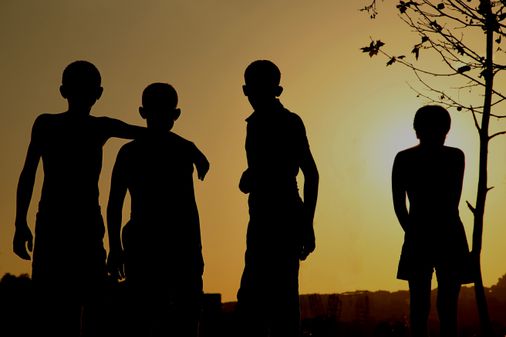Last month US Secretary of State Antony Blinken held a press conference to release the departments annual Trafficking in Persons Report. As a gay, male survivor of sex trafficking, I listened. Blinken acknowledged that systemic racism makes people more vulnerable to human trafficking in the United States. The report included sections on racism and LGBTQ youth. For the first time, in the pages of a US government publication on human trafficking, I saw my story, the story of a gay child trafficked into the sex industry.
I grew up in a religious household in a conservative Texas town. At 16, my parents, horrified that I was gay, gave me an ultimatum: Either you are going to conversion therapy, or you need to get out of my house! Kicked out of the house, I found myself homeless and alone. Soon, a trafficker masquerading as a Good Samaritan took me into his home and his massage business. I was trafficked into forced prostitution. Although I was still a child, my gender, sexual orientation, and race (Latino) rendered me invisible. I did not fit the Hollywood profile of a sex trafficking victim: I was not white, I was not blonde, and I was not female.
At the time, I didnt know I was a victim of sex trafficking. I didnt know boys could be trafficked. The movie Taken was the only mass media on human trafficking I could find. But I was nothing like the young white girl who grew up rich, only to be kidnapped while on vacation in Paris. I searched but couldnt find anyone who looked like me in the medias portrayal of human trafficking.
After I escaped, I struggled. I began experiencing episodes of PTSD, anxiety, and depression. I used drugs and alcohol to cope. I felt worthless. I turned to survival sex, joining a community of unseen Black and brown LGBTQ boys and girls on the streets of Houston. I was jailed three times, kicked out of bars, and unable to hold a job. I needed help, but I stayed silent. My trafficker had groomed me to believe that I would get in trouble if anyone found out. Years later, authorities in London arrested my trafficker, Jason Gandy, as he tried to traffic another child. I testified at his trial in Texas; he was sentenced to 30 years in federal prison.
It took me more than a decade to identify as a human trafficking survivor. Im an adult now. One would think that the fight for survival would be long behind me. But Im still fighting to be seen and heard. I am still fighting for acknowledgement that trafficking survivors can look like me. Instead, the anti-trafficking movement amplifies the voices of survivors who look like the victims in Taken. Many organizations and people who claim to be allies advocate for us only when they need to use us for clout for Juneteenth or Pride month. Each day, I experience first-hand the racism and homophobia that Americans continue to harbor. There is progress, but it is halting and too slow.
In the State Department Trafficking in Persons Report, I finally saw stories of LGBTQ survivors, and even a profile of a male survivor. This is a start, but its not enough. We need investment, not just words: investment in homeless services for youth; investment in foster care programs for LGBTQ children whose parents have rejected them; investment in survivors. We need outreach and services to underserved communities. Black and brown LGBTQ boys and girls need to know that the trafficking they disproportionally suffer is not their fault. They need services now, not later. They shouldnt have to wait a decade to get the help that they need, as I did.
Homeless LGBTQ people of color have long been exploited as trafficking victims. Where are we in the public awareness campaigns? Where are we at the press conferences? Where are we when policy makers make decisions about us?
Martin Luther King Jr. told us that human progress never rolls in on wheels of inevitability. It comes through the tireless efforts and the persistent work of dedicated individuals. I invite all to join me in this persistent work. I will be invisible no more.
Jose Alfaro is writing a memoir of his experience as a sex trafficking survivor. He is an advisor to the Human Trafficking Legal Center andwas featured in the GBH News Series Unseen: The Boy Victims of the Sex Trade.read more
I’m a survivor of sex trafficking and invisible no more


